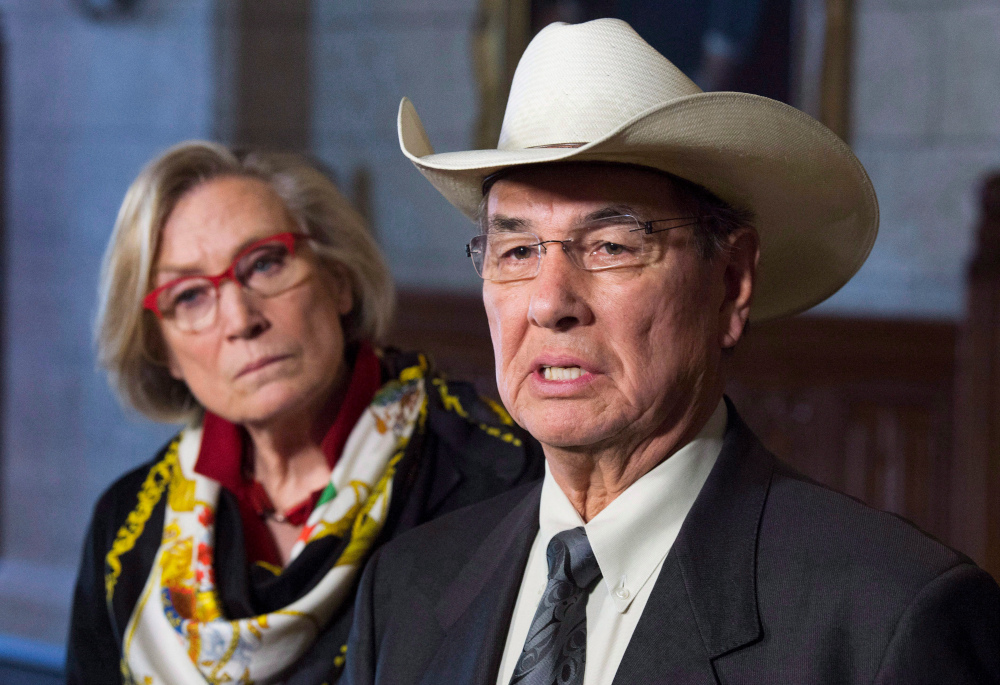Almost a year after the House of Commons passed a law committing Canada to accept the United Nations Declaration on the Rights of Indigenous Peoples, the legislation is stalled in the Senate.
And there is a growing risk that the legislation will die there. Once the fall election campaign begins, all bills not passed will die and must be re-introduced after the vote.
Grand Chief Wilton Littlechild of the Cree nation helped draft the UN declaration and has been working for 12 years to have Canada adopt it.
Seeing the law stalled in the Senate for “no apparent good reason is disconcerting and disappointing,” said Littlechild, a lawyer and former Progressive Conservative MP. “I have not heard good reasons yet why it should not pass, so I can only surmise that it’s an election strategy to delay it.”
The Liberals promised to adopt the UNDRIP principles in their 2015 election platform. The declaration affirms a variety of rights for Indigenous people, including control over developments affecting their lands and recognition of their suffering over past injustices.
In April 2016, NDP MP Romeo Saganash introduced Bill C-262, a private member’s bill “to ensure that the laws of Canada are in harmony with the United Nations Declaration on the Rights of Indigenous Peoples.”
Private members’ bills rarely pass, but it made its way through the House and passed in May 2018. The New Democrats and Liberals supported the bill. The Conservatives were opposed.
The bill then moved to the Senate where it stalled. It hasn’t finished second reading — a round of debate followed by a vote — and still has to go to the Senate’s Aboriginal Peoples Committee before the third reading.
But the Senate is scheduled to break for the summer June 28 and won’t return before the October election.
Politicians and supporters of the bill have accused Conservative senators of deliberately stalling the bill.
Earlier this month, Attorney General David Lametti and Crown-Indigenous Relations Minister Carolyn Bennett wrote a letter to Conservative Senate leader Larry Smith, accusing his party of “stall tactics,” such as adjourning debate on the bill, to keep it from being passed.
And on April 10, the House of Commons passed a motion requesting the Senate pass the UNDRIP bill and another that’s been stalled. (Bill C-377, sponsored by former interim Conservative leader Rona Ambrose, would require anyone seeking a federal judicial appointment to have sexual assault training. It passed the House unanimously in 2017 and is still awaiting Senate approval.)
Support for the bill has spurred rallies.
What’s taking so long?
The Tyee reached official critic of Bill C-262, Conservative Senator Dennis Glen Patterson, to ask about the hold up. (Every bill in the Senate has both a sponsor and a critic.)
Patterson, a former Northwest Territories premier, rejected the notion that Conservative senators are intentionally delaying the bill, saying that the Liberal government first delayed it in the House.
“It languished in the House of Commons for the better part of two years, before being even referred to committee,” he said.
The Liberals also opted to sponsor Saganash’s bill rather than introducing new legislation. That means it stayed as a private member’s bill, which, according to the rules, gets slower treatment than if it were a government-sponsored bill.
He said he understands the frustration over how long it’s been taking to get a working framework of Indigenous rights in Canada. He’s been involved at least since Section 35, the Aboriginal and Treaty Rights section of the Constitution, was patriated in 1982.
“There were no less than three solid years of meetings with Indigenous leaders and with federal, provincial and territorial cabinet ministers to put flesh on existing Aboriginal rights. And we failed to do so. So it’s been a long struggle.”
The Aboriginal Peoples Committee, which Patterson is part of, is currently pre-studying Bills C-91 and C-92, government-sponsored bills dealing with Indigenous languages and Indigenous child welfare.
They have yet to pass through the House of Commons, but Patterson suggested the Senate committee get a head start so that when the bills are referred, they can be dealt with sooner. Because they are government bills, the Senate is required to address them before any private member’s bill.
“Had the government chosen to make [Bill C-262] a government bill, it could well be further ahead in the lineup,” Patterson said.
“In theory we could deal with it in the month of June,” Patterson said, noting that he doesn’t influence the Senate schedule. And while ordinarily the Senate breaks for summer at the end of June, it could continue to work into the summer if required, he said.
“We have a lot of work to do up to that time. And of course, we’ve just received a how-many-hundred-page Budget Implementation Act,” he said.
The Aboriginal Peoples Committee will be asked to deal with the Indigenous Services section of the budget, he said.
“We are jammed with a number of bills, some of them are controversial. I don’t need to tell you that C-69 [which would overhaul environment assessments for industry in Canada] is a bill that’s attracted great controversy. C-48 is also in the Senate, the anti-tanker ban bill,” he said.
“So, I don’t want you to be under the illusion that something might not fall by the wayside as we deal with this intense legislative logjam that is piling up. But we’re working hard. The Aboriginal Peoples Committee has been authorized to meet extra days and extra hours to cope with the workload.”
Patterson also noted that the parliamentary schedule, set by the Liberal government, gave five break weeks in March and April. “Crucial weeks leading up to the last session of parliament. I am amazed that these breaks have been built into the parliamentary schedule when we really least need them,” he said.
“I have to say that people who think the Senate is deliberately stalling on this bill may not understand all the challenges that we face,” he added.
Consent ‘gives me heartburn’
Conservative Senator Scott Tannas has asked questions nearly every time the bill is raised in the Senate.
He did not grant an interview to The Tyee, but his questions give an idea of his concerns about Bill C-262.
“I support the UNDRIP in its entirety, with the exception of the word that gives me heartburn, which is ‘consent,’” Tannas said on April 2. The UN declaration requires the consent of First Nations for activities and development on their traditional territories. Tannas said that would amount to veto power over projects.
Conservative Senator Paul J. Massicotte raised the issue in February. “Should I be concerned about the fact we’re now introducing a new word called ‘consent.’ If you look at the dictionary, consent means approval; approval means you have to do so, and it nearly suggests that they have a right to say no.”
Littlechild said the declaration says nothing about giving First Nations a veto on projects.
“That’s one of the biggest mischaracterizations of the declaration. When you read it, you will not find the word veto anywhere — and I hope they have read it, those that have said that, after all there are only 46 articles,” he said “You will not find the world ‘veto’ anywhere... That’s a scare tactic, a fear-mongering that’s being used by those who can’t find a better argument to oppose it.”
“What it calls on us to do is to say yes. It calls on us to work together. This is not about somebody vetoing something over another. It’s completely the opposite... It’s actually a call to action for us to work together and for us to have a right to say yes,” he said.
Developing and winning approval for the United Nations Declaration of Indigenous Rights took more than 20 years and a great deal of work and cooperation, he said. “It wasn’t to find problems. It was to find solutions.”
The declaration presents solutions to problems that have existed since Confederation, Littlechild said.
A lot has been written about whether the requirement of “free prior and informed consent” to projects really equals veto power.
Littlechild said that people need to understand the UN Declaration on the Rights of Indigenous Peoples is not about adding extra rights or benefits. It’s about bringing them up to basic human rights standards.
“In 1948, when the Universal Declaration on Human Rights was adopted by the whole world, and everybody was gifted human rights as a human being, we were left out. Indigenous peoples were not granted the same level of human rights. That’s why we had to go to battle at the UN.... One of the purposes is to ensure that the Universal Declaration of Human Rights applies to Indigenous peoples just like all other human beings,” he said.
“It’s not a special request. We’re saying, look, others have human rights, why can’t we have the same human rights?”
He added that Canada’s residential school history, with all the harm it brought, had a legislative foundation. “So why couldn’t having good relations have a similar legislative foundation, which the declaration offers?” ![]()
Read more: Indigenous, Federal Politics
















Tyee Commenting Guidelines
Comments that violate guidelines risk being deleted, and violations may result in a temporary or permanent user ban. Maintain the spirit of good conversation to stay in the discussion.
*Please note The Tyee is not a forum for spreading misinformation about COVID-19, denying its existence or minimizing its risk to public health.
Do:
Do not: